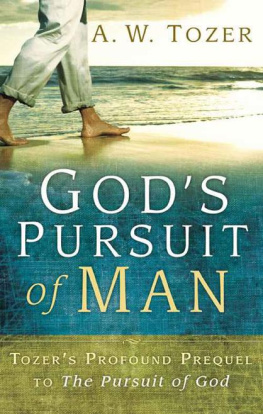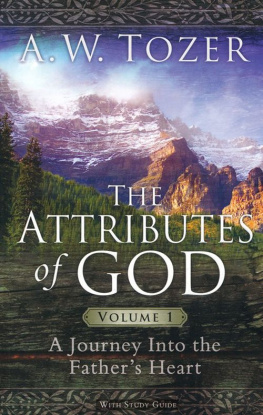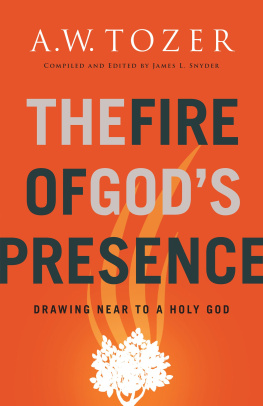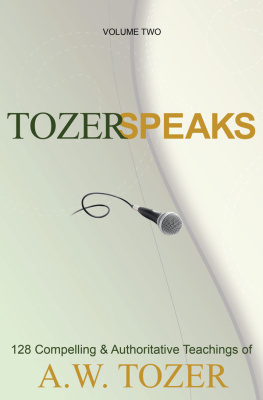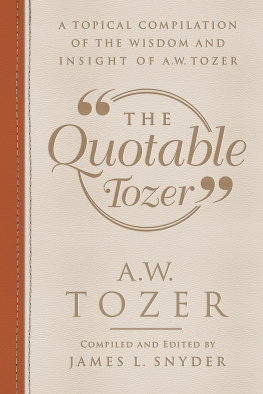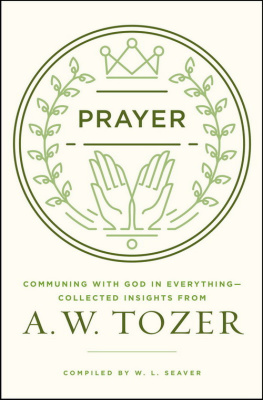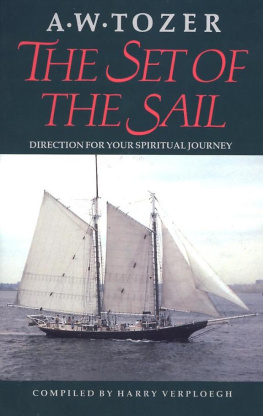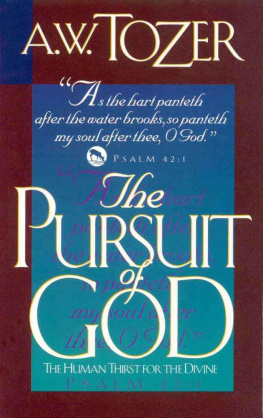Gods Pursuit of Man
Tozers Profound Prequel to The Pursuit of God
by
A. W. Tozer
1950, renewed 1978 by Lowell Tozer.
To all those pilgrims of eternity whose distrust with earth has constrained them to seek in God a more enduring substance, this little work is offered in humble dedication.
Library of Congress Cataloging-in-Publication Data
Tozer, A. W., 1897-1963
Gods Pursuit of Man / A. W. Tozer.
Previously titled The Divine Conquest and The Pursuit of Man
ISBN: 978-1-60066-278-2
Contents
This book contains strong medicine, bitter to the taste but potent if taken in contrition and in belief. For a generation content in its own smugness, emotionally exhausted by the claptrap and bunkum of some well-meaning but misled leaders, glibly familiar with all the niceties of careful theological phrases, the medicine may be too bitter. Only the hopeless will benefit. May the slain of the Lord be many; may the hopeless be multiplied. Only then can we experience what some of us know by rote.
Some will point out where they disagree. Too much this or too much that will be the dodge. Dont be among them. What if something is said differently? What if the preacher holds another view of sovereignty, of holiness, of man (he may be right)? Dont miss the pith because you are engrossed in a study of the bark.
The author is a prophet, a man of God; his life as well as his sermons attest the fact. Here he speaks; no, he preaches; no, he thunders the message of God for those of us who are dreadfully poverty-stricken, though we think we are rich and have need of nothing. Dont be afraid of the thunderings of the language. Dont even fear the bold, jagged stroke of lightning of the speech. For all who will hear, for all who will obey, here is Gods answer to our needHimself.
William Culbertson
Past President, Moody Bible Institute
It is, I suppose, quite impossible for anyone familiar with the Old Testament to sit down to the writing of a book without remembering with some uneasiness the words of the preacher, the son of David, king in Jerusalem, And further, by these, my son, be admonished: of making many books there is no end; and much study is a weariness of the flesh (Ecclesiastes 12:12).
I think we may safely conclude that the world has by that tired utterance been spared the ordeal of a vast number of worthless books which might otherwise have gotten themselves written. For this we may be indebted to the wise old king more deeply than we know. But if this remembrance of the many books already written has helped even a little to check the making of other poor ones, may it not also have worked to prevent the appearance of some which might indeed have held an authentic message for mankind? I do not think so.
The only book that should ever be written is one that flows up from the heart, forced out by the inward pressure. When such a work has gestated within a man it is almost certain that it will be written. The man who is thus charged with a message will not be turned back by any blase consideration. His book will be to him not only imperative, it will be inevitable.
This little book of the spiritual way has not been made in any mechanical sense; it has been born out of inward necessity. At the risk of getting myself into doubtful company I might claim for myself the testimony of Elihu, the son of Barachel the Buzite, of the kindred of Ram, For I am full of matter, the spirit within me constraineth me (Job 32:18). And his fear that if he did not speak he must, as a new bottle, burst asunder is well understood by me. The sight of the languishing church around me and the operations of a new spiritual power within me have set up a pressure impossible to resist. Whether or not the book ever reaches a wide public, still it has to be written if for no other reason than to relieve an unbearable burden on my heart.
Along with this frank account of its spiritual genesis, let me further say (and waive the seeming contradiction) that I claim for the book neither originality nor any degree of inspiration beyond that which may be enjoyed by any of the servants of Christ. The pressure of which I speak may prove to be nothing more than the squeeze and stress which result from the effort to be good in a bad world and to honor God in the midst of a generation of Christians which seems bent upon giving glory to everyone else but Him.
As for originality, has not someone remarked that no one since Adam has been wholly original? Every man, said Emerson, is a quotation from his ancestors. All that I can hope is that this book may be a right emphasis coming at a right time. If the reader should discover here anything really new he is in conscience bound to reject it, for whatever in religion is new is by the same token false.
Without a doubt the reader will detect upon these pages traces of other hearts beside my own. I would be the first to point out that the influence of many minds is everywhere upon them. The masters of the inner life are here (however imperfectly represented), the saintly teachers at whose feet I have sat long and lovingly and from whose wells I have drawn water with reverence and gratitude. I lift thankful eyes to God for the men who have taught me to desire the better way: Nicholas Herman and that other Nicholas of Cusa and Meister Eckhart and Fenelon and Faber. These I name because they have helped me most, but there have been many others also. Among them is quaint old John Smith, M.A., whose name renders him almost anonymous. I know almost nothing about him except that his style is like that of Lord Francis Bacon and his spirit like the spirit of the fourth Gospel and that he once thoughtfully published a few of his sermons, one of which, in a happy moment, a veteran missionary kindly placed in my hands.
Toward anything like thorough scholarship I make no claim. I am not an authority on any mans teaching; I have never tried to be. I take my help where I find it and set my heart to graze where the pastures are greenest. Only one stipulation do I make: my teacher must know God, as Carlyle said, otherwise than by hearsay, and Christ must be all in all to him. If a man have only correct doctrine to offer me I am sure to slip out at the first intermission to seek the company of someone who has seen for himself how lovely is the face of Him who is the Rose of Sharon and the Lily of the Valley. Such a man can help me, and no one else can.
The argument of this book is the essential interiority of true religion. I expect to show that if we would know the power of the Christian message our nature must be invaded by an Object from beyond it; that That which is external must become internal; that the objective Reality which is God must cross the threshold of our personality and take residence within.
In arguing thus it could be said that I am wrong, but as Blake once wrote, If I am wrong, I am wrong in good company. For is it not simply another way of saying, It is the spirit that quickeneth; the flesh profiteth nothing (John 6:63)? The essentiality of a right interior life was the burden of Christs teaching and was without doubt one of the main causes of His rejection by those notorious externalists, the Pharisees. Paul also preached continually the doctrine of the indwelling Christ, and history will reveal that the Church has gained or lost power exactly as she has moved toward or away from the inwardness of her faith.
Perhaps a word of warning would not be amiss here: It is that we beware the common habit of putting confidence in books, as such. It takes a determined effort of the mind to break free from the error of making books and teachers ends in themselves.
The worst thing a book can do for a Christian is to leave him with the impression that he has received from it anything really good; the best it can do is to point the way to the Good he is seeking. The function of a good book is to stand like a signpost directing the reader toward the Truth and the Life. That book serves best which early makes itself unnecessary, just as a signpost serves best after it is forgotten, after the traveler has arrived safely at his desired haven. The work of a good book is to incite the reader to moral action, to turn his eyes toward God and urge him forward. Beyond that it cannot go.
Next page
